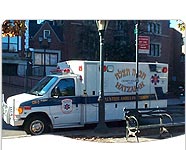 
Extended-Release Nifedipine Seen Safe for Long-Term Treatment of Angina
Reuters Health
(Reuters Health) Long-acting nifedipine, added to standard treatment for stable symptomatic angina pectoris, safely reduces the need for angiography and interventions for symptoms, according to results of the ACTION study.
In the mid 1990s, the safety of short-acting calcium-channel blockers was called into question, Dr. Philip A. Poole-Wilson and his associates explain in The Lancet, published online August 31st. To investigate clinical outcomes after extended therapy with long-acting calcium antagonists, the multinational research team designed ACTION -- A Coronary Disease Trial Investigating Outcome with Nifedipine.
The trial included 7665 patients with stable angina, randomly assigned to long-acting nifedipine gastrointestinal therapeutic system (GITS) 60 mg per day or placebo. Patients were already taking standard anti-anginal, blood pressure, and lipid-lowering drugs.
Dr. Poole-Wilson, a cardiologist at Imperial College London, and his colleagues report that during a mean follow-up of 4.9 years, the number of patients who died did not differ significantly between groups: 1.64 per 100 patient-years in the nifedipine arm and 1.53 per 100 patient-years in the placebo arm (p = 0.41).
The groups did not differ significantly in the primary endpoint -- i.e., the combination of death, acute MI, refractory angina, new overt heart failure, debilitating stroke and peripheral revascularization. Rates were 4.60 and 4.75 per 100 patient-years in the nifedipine and the placebo group, respectively (p = 0.54).
However, nifedipine significantly reduced the rate of new overt heart failure. It was also associated with significantly reduced need for coronary angiography and bypass surgery.
Furthermore, among patients with raised blood pressure at baseline, the study drug reduced the combined rate of death and major cardiovascular events by 13%, the investigators note.
Reviewing these findings in a related editorial, Drs. Bruce M. Psaty and Curt D. Furberg write, "ACTION provides support for the long-term treatment of the symptoms of angina in patients already on beta blockers and nitrates."
They maintain that long-acting calcium-channel blockers are also appropriate third- or fourth-line treatment for hypertension that does not respond to diuretics, beta-blockers, ACE inhibitors, or angiotensin receptor blockers.
Dr. Psaty is based at the University of Washington in Seattle, and Dr. Furberg at Wake Forest University School of Medicine in Winston-Salem, North Carolina.
Lancet 2004.
The above message comes from "Reuters Health", who is solely responsible for its content.
The above is for general informational purposes only. Always consult your
physician regarding specific medical issues and call Hatzalah or your local
ambulance service in the event of an emergency.
Back to Digest Index
|









